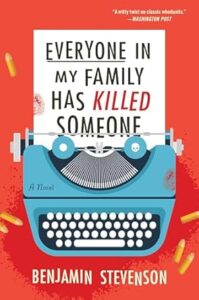Ernest Cunningham Series by Benjamin Stevenson
Everyone in My Family Has Killed Someone (Book 1)
Everyone on This Train is a Suspect (Book 2)
Everyone This Christmas has a Secret (Book 3)
*Links above should take you to Penguin.com.au – the publisher in Australia for the author. That page can direct you to the distributor/retailer of your choice.

Amazon Cover
BOOK BLURB ON AMAZON for EVERYONE IN MY FAMILY HAS KILLED SOMEONE
Knives Out and Clue meet Agatha Christie and The Thursday Murder Club in this “utterly original” (Jane Harper), “not to be missed” (Karin Slaughter), fiendishly clever blend of classic and modern murder mystery.
Everyone in my family has killed someone. Some of us, the high achievers, have killed more than once. I’m not trying to be dramatic, but it is the truth. Some of us are good, others are bad, and some just unfortunate.
I’m Ernest Cunningham. Call me Ern or Ernie. I wish I’d killed whoever decided our family reunion should be at a ski resort, but it’s a little more complicated than that.
Have I killed someone? Yes. I have. Who was it?
Let’s get started.
EVERYONE IN MY FAMILY HAS KILLED SOMEONE: My brother, my stepsister, my wife, my father, my mother, my sister-in-law, my uncle, ,y stepfather, my aunt …
Me
MY REVIEW for EVERYONE IN MY FAMILY HAS KILLED SOMEONE
This book opens with a Prologue. If you have been following me any length of time, you know I have FEELINGS about prologues. This one is done right! (if you just want to look at the prologue, some booksellers provide a 10% view – so that part should be visible, but, let me warn you, if you like mysteries and snark, you will be hooked.)
As an editor the acknowledgements from the real author (Benjamin Stevenson) to his editor – not the POV Ernest Cunningham to his also fictional editor – made me go, whoa, because, yeah, keeping track of those pages for the deaths would have been a THING. In the prologue, the page numbers of every death is provided – not an easy task to keep track of – especially when paperback and hardback books often have slightly different formatting.
Anyway, the book. “Everyone in my Family has Killed Someone” – yep – title pretty much says it all. Toxic close-knit, caring trauma-bonded family with a main character full of inappropriate snarky comments, presently serving his time as the family’s pariah, but the family reunion put together by his aunt demands ALL OF US MANDATORY (this means you). He remained close to one not-quite-on-the-outs-but-sliding-that-way stepsister and they start the reunion with family bingo “Family member is late” “someone gets a broken bone” etc.
Snark and murder mystery. Snow and ash. Family dynamics and money. What’s not to love?

Amazon Cover
BOOK BLURB ON AMAZON for EVERYONE ON THIS TRAIN IS A SUSPECT
From the bestselling author of Everyone in My Family Has Killed Someone, a fiendishly fun locked room (train) murder mystery in the spirt of Murder on the Orient Express. With Ernest Cunningham, “Stevenson has brought a modern-day Poirot to the mystery scene” (Michelle Carpenter).
When the Australian Mystery Writers’ Society invited me to their crime-writing festival aboard the Ghan, the famous train between Darwin and Adelaide, I was hoping for some inspiration for my second book. Fiction, this time: I needed a break from real people killing each other. Obviously, that didn’t pan out.
The program is a who’s who of crime writing royalty: the debut writer (me!), the forensic science writer, the blockbuster writer, the legal thriller writer, the literary writer, the psychological suspense writer …
But when one of us is murdered, the remaining authors quickly turn into five detectives. Together, we should know how to solve a crime. Of course, we should also know how to commit one.
How can you find a killer when all the suspects know how to get away with murder?
MY REVIEW for EVERYONE ON THIS TRAIN IS A SUSPECT
Did I like Everyone on this Train is a Suspect more than the first book? Well, yes I did. Is it because I have attended a lot more book conventions (over a dozen) than I have gone to ski resorts (which is zero) or family reunions (which is not zero but not a dozen), … possibly.
I still love the gimmick of telling the reader things. Last time, it was on which page deaths would be revealed, this time it was the beat structure of the book (how many words need to happen in each section) and how many times the murderer’s name was used. Mixed with the cozy talking through the non-existent fourth wall, the overall package just works. The voice of the book is delightful.
Ernie challenge when boarding the train is how to write a FICTION book after what was basically a memoir of death; his advance has a rapidly approaching deadline, like an engine bearing down on him. This focus is quickly superseded by the petty politics of guests at the convention (not something I have experienced in my writer and con community), because procrastination is king. Then the guest of honor had a very, very bad morning, and everyone on the train is a suspect. (Fortunately for Ernie, who now has inspiration for his next book … but everyone wonders if he decided to be his own muse.)
The story is definitely a train I would ride … I just might be in the forward carriages though.

Amazon Cover
BOOK BLURB ON AMAZON for EVERYONE THIS CHRISTMAS HAS A SECRET
Benjamin Stevenson returns with a Christmas addition to his bestselling, “deviously good fun” (Nita Prose). Unwrap all the Christmas staples: presents, family, an impossible murder or two, and a deadly advent calendar of clues. If Knives Out and The Thursday Murder Club kissed under the mistletoe.
My name’s Ernest Cunningham. I used to be a fan of reading Golden Age murder mysteries, until I found myself with a haphazard career getting stuck in the middle of real-life ones. I’d hoped, this Christmas, that any self-respecting murderer would kick their feet up and take it easy over the holidays. I was wrong.
So here I am, backstage at the show of world-famous magician Rylan Blaze, whose benefactor has just been murdered. My suspects are all professional tricksters, masters of the art of misdirection: THE MAGICIAN, THE ASSISTANT, THE EXECUTIVE, THE HYPNOTIST, THE IDENTICAL TWIN, THE COUNSELLOR, THE TECH.
My clues are even more abstract: A suspect covered in blood, without a memory of how it got there. A murder committed without setting foot inside the room where it happens. And an advent calendar. Because, you know, it’s Christmas.
If I can see through the illusions, I know I can solve it.
After all, a good murder is just like a magic trick, isn’t it?
MY REVIEW for EVERYONE THIS CHRISTMAS HAS A SECRET
Another awesome cozy mystery thriller … I know “cozy thriller” shouldn’t go together, but since the POV narrator gives stuff away throughout the story, diffusing tension, the mystery doesn’t keep you on the edge of your seat, but burrowed in your blanket turning pages.
Again, the prologue opening is hilarious and sets up the gimmick for the book well. This one, being Christmas, is an advent calendar, which is a bit kinder on the editor than previous editions (the first book of the series, listing the page of each killing, had to be brutal during final formatting for all the different books – hardback, mass market paperback, trade paperback, UK, USA, Australia, etc).
The beginning paragraph is a perfect hook, and the rest of the story keeps a reader hooked.
All three books were checked out through my local library. I had to wait a little for the final one because I requested it early (only four months after publication) and several other people wanted to read it too. Support your local library!





